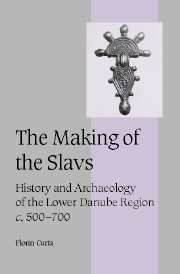Book contents
- Frontmatter
- Contents
- List of figures
- List of tables
- Acknowledgments
- List of abbreviations
- Introduction
- 1 Slavic ethnicity and the ethnie of the Slavs: concepts and approaches
- 2 Sources for the history of the early Slavs (c. 500–700)
- 3 The Slavs in early medieval sources (c. 500–700)
- 4 The Balkans and the Danube limes during the sixth and seventh centuries
- 5 Barbarians on the sixth-century Danube frontier: an archaeological survey
- 6 Elites and group identity north of the Danube frontier: the archaeological evidence
- 7 “Kings” and “democracy”: power in early Slavic society
- Conclusion: the making of the Slavs
- Appendix A
- Appendix B
- References
- Index
- Cambridge Studies in Medieval Life and Thought Fourth series
1 - Slavic ethnicity and the ethnie of the Slavs: concepts and approaches
Published online by Cambridge University Press: 08 July 2009
- Frontmatter
- Contents
- List of figures
- List of tables
- Acknowledgments
- List of abbreviations
- Introduction
- 1 Slavic ethnicity and the ethnie of the Slavs: concepts and approaches
- 2 Sources for the history of the early Slavs (c. 500–700)
- 3 The Slavs in early medieval sources (c. 500–700)
- 4 The Balkans and the Danube limes during the sixth and seventh centuries
- 5 Barbarians on the sixth-century Danube frontier: an archaeological survey
- 6 Elites and group identity north of the Danube frontier: the archaeological evidence
- 7 “Kings” and “democracy”: power in early Slavic society
- Conclusion: the making of the Slavs
- Appendix A
- Appendix B
- References
- Index
- Cambridge Studies in Medieval Life and Thought Fourth series
Summary
Our present knowledge of the origin of the Slavs is, to a large extent, a legacy of the nineteenth century. A scholarly endeavor inextricably linked with forging national identities, the study of the early Slavs remains a major, if not the most important, topic in East European historiography. Today, the history of the Slavs is written mainly by historians and archaeologists, but fifty or sixty years ago the authoritative discourse was that of scholars trained in comparative linguistics. The interaction between approaches originating in those different disciplines made the concept of (Slavic) ethnicity a very powerful tool for the “politics of culture.” That there exists a relationship between nationalism, on one hand, and historiography and archaeology, on the other, is not a novel idea. What remains unclear, however, is the meaning given to (Slavic) ethnicity (although the word itself was rarely, if ever, used) by scholars engaged in the “politics of culture.” The overview of the recent literature on ethnicity and the role of material culture shows how far the historiographical discourse on the early Slavs was from contemporary research in anthropology and, in some cases, even archaeology.
THE HISTORIOGRAPHY OF SLAVIC ETHNICITY
Slavic studies began as an almost exclusively linguistic and philological enterprise. As early as 1833, Slavic languages were recognized as Indo-European.
- Type
- Chapter
- Information
- The Making of the SlavsHistory and Archaeology of the Lower Danube Region, c.500–700, pp. 6 - 35Publisher: Cambridge University PressPrint publication year: 2001



